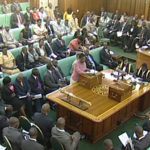By Richard Wanambwa
The Members of Parliament (MPs) last week passed the Landlord and Tenant Bill 2018 into an Act of Parliament, well knowing they did not do a good work especially on the side of landlords since the aim of the Act appears to save the majority voters who send the MPs to the legislature, more so when you bring 2021 elections into the picture. The bill/Act is not balanced and does not appreciate the contribution of the real estate industry (landlords) to the economy. It is unlikely that President Museveni will assent to the Act in current the form to make it law.
Firstly, in most countries a business / commercial tenancy is regulated differently to a residential tenancy. They are not regulated under the same Act. Members of Parliament are being disingenuous by stating that they are. The tenancy acts are regulated differently as business tenants who incur significant capital costs in fitting out there premises whether it be to trade, manufacture or produce require guaranteed tenure for the lifespan of the tenancy whereas residential tenants require the flexibility of notice periods.
Kacita has pushed the notice issue as their members do not put any capital into their premises and do not necessarily manufacture products, the Act as passed has protected small traders from the fixed term of a lease but will impact significantly on formalized business as they are not in a position to set up business where they cannot guarantee the full tenure)
An agreement is made based on two parties requirements, how can the minster prescribe the agreement to be used, this can be done in affordable housing and smaller tenancies where the tenant is only installing movable fittings or stock but not in formalized tenancy’s where there are tenant installations or landlords develop fit for purpose space for tenants on the back of a lease back.
There is a glaring error of not including the period of the tenancy in the requirements of the Act, which is the most important part of any tenancy agreement, which goes to the root of the problem of the Act, the legislators don’t understand the business of the property sector.
The Act requires that an agreement is defined 14 days after the occupation of a tenant. This creates disputes as the tenant is in occupation prior to finalization of the agreement. This can only lead to a dispute and should be amended to being defined prior to occupation. 6. Legislators have not defined what comprises “premises” or “common area” or “building”. Premises by law are what the tenant occupies. It is unsustainable that the landlord maintains the internals of the tenant premises as the Act requires. The landlord should maintain the Building, and the tenant his premises.
A covenant by a tenant to maintain premises is void – how is this sustainable as the tenant has to be responsible for maintaining his fixtures and fittings the way the act reads, the landlord has to maintain tenant’s assets. In an engineering works the Landlord would have to maintain the tenants’ equipment as the Act reads.
The Minister is to prescribe the form of tenancy agreements and notices thereto for the landlord to use – the minister is not party to the deal done and therefore there cannot be a standard agreement prescribed by law.
All tenancy agreements are void if they do not prescribe to all regulations in the Act – The regulations of the act are untenable and therefore all tenancies shall be void.
The Act requires the Landlord to meter sewerage to recover such, it is impossible to meter sewerage so by definition of the Act the landlord has to pay all sewerage costs.
The landlord is responsible for all installation costs in connection to water, gas, sanitation, sewerage or other utility services – this works for small tenants or house with tenants but what of large scale data centres or refrigerated warehouses or supermarkets were load requirements are specific to the nature of the business, the landlord will not find it viable to incur these costs and if the tenant pays for these installations, then the agreement is void as per the Act and the landlord could suffer imprisonment – So major industry grinds to a halt unless the tenant becomes his own landlord, so SME business who cannot afford their own property will cease to grow and trade, impacting on job creation and stifling the economy
Deposit cannot equate to more than one months rental – this impacts on finance which requires a three month deposit, also the landlord can only react to an abandonment as per the ACT after a 45 day process, So operationally the Landlord is at risk prior to the tenancy commencement and in turn market rentals will have to increase to defer this risk, making accommodation more expensive therein creating more housing shortages in the long term. The final impact of this is more informal or shanty housing, leaving lower income Ugandans worse off thanks to the Act and seriously disenfranchising them.
Landlord cannot increase rental at a rate of more than 10 per cent, on shilling based loans the landlord already has a loss as interest rates are nearly double this, also does not take into account beneficial occupation period or rent free periods were in effect the rental would escalate way more than 10 per cent in the first year, making the tenancy agreement void and the landlord culpable to a prison sentence as per the ACT for giving a rent free period to a tenant.
Consent to terminate can be given orally, this can only be disputed and create a log jam in the courts as parties will dispute what was agreed.
A landlord can be imprisoned for a period of one year for aggravating a tenant, aggravation is not even defined in the Act and this can only end up in coercive practices, the question remains as to have a civil agreement between parties and a dispute thereof can lead to criminal proceedings. It is in doubt if this is legally tenable.
Financing of real estate developments requires the recipient of the loan to ensure that his revenue streams are in the same currency so as to obtain the loan. Dollar based finance arrangements are at an average interest level of 7 per cent currently and shilling based loans are at 20 per cent. These interest rates are an input expense in to a development and the developer requires rental revenue streams to mitigate expenses otherwise developers will not proceed.
The case study below shows a residential house at a capital cost of $50 000 / Shs185 000 000 and what rental the landlord would require to cover loan obligations so as to invest. Dollar Based Transaction Shilling Based Transaction Capital Cost: $50 000/ Shs185 000 000 Interest 7 per cent 20 per cent Loan Term 10 Years 10 Years Monthly Loan Repayment $580.54 Shs3 575 229 Comparison Rental in Shs2 147 998 Shs575 229
Required rental rates to cover a shilling based transaction at current interest rates would impact on rental revenue required for viability to be 66.44 per cent more expensive than a dollar based transaction Should government introduce a cap on interest rates at 5 per cent above the CBR rate, then for argument sake the interest rate was capped at 15 per cent the required rental would still be 38.95 per cent higher on a shilling transaction than a dollar transaction.
The impact of this Act will drive required rentals higher and impact negatively on the growth of the economy. Higher rental rates will see further closure of businesses, lower employment levels and less tax revenue. Vacancies will put further pressure on the property market and most importantly foreign currency loans will have to be converted into shilling based loans. Local Banks will be inundated with financing requests which they do not have adequate capital to sustain.
Non-performing loans in Uganda will increase and the currency will further destabilize. Basically the Act does not allow for property development growth, protects a small band of traders in the Central Business District and negatively impacts on the Ugandan economy, which in turn will hurt the very demographic it was due to protect. In short those with access to hard currency will continue to enrich themselves and the lower income demographic will be further down trodden – The Rich Will Get Richer, The Growth of The Middle Class Will Grind To a Halt, the Poor Will Get Poorer and the country will destabilize into chaos!!
@WanambwaRichard
richardwanambwagmail.com
richardwanambwa@eagle.co.ug
Richard Wanambwa is the Managing Partner BigFoot Media and Publications Limited






